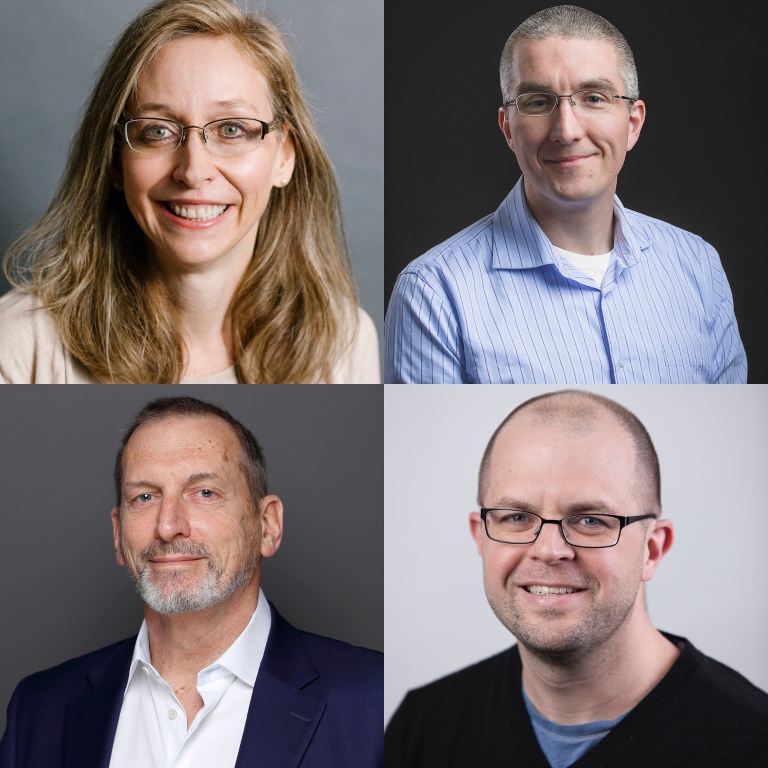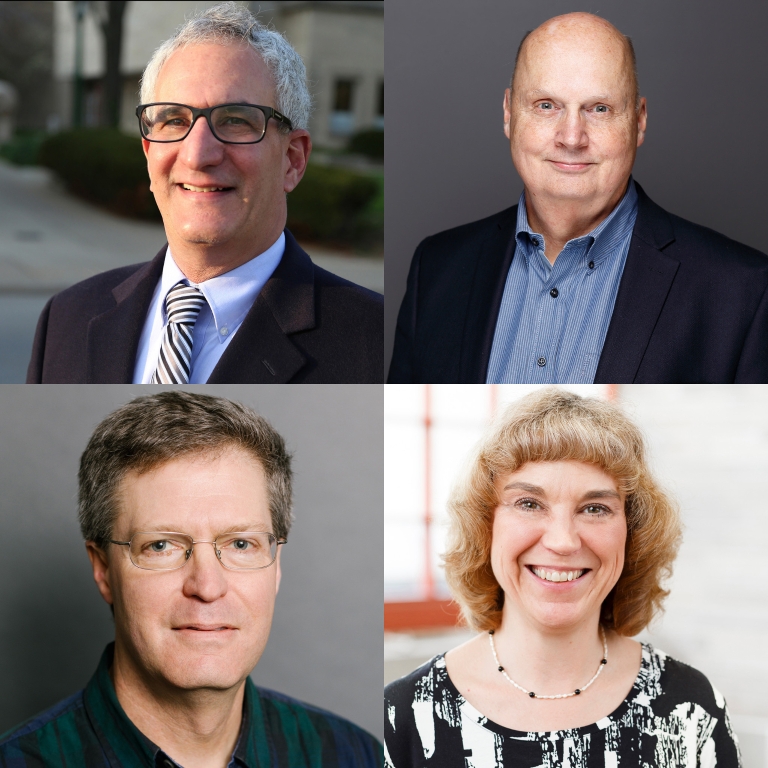
Andrea Hohmann, Daniel Kearns, David Kehoe and Jay-Terrence LennonView print quality image
From left, top row: Andrea G. Hohmann and Daniel B. Kearns; bottom row: David M. Kehoe and Jay-Terrence Lennon. Photos by Indiana University
Brought to you by WBIW News and Network Indiana
Last updated on Friday, November 30, 2018
(BLOOMINGTON) - Eight faculty members at Indiana University have been named fellows of the American Association for the Advancement of Science, an honor that recognizes their outstanding contributions to the progress of science and research.

Andrea Hohmann, Daniel Kearns, David Kehoe and Jay-Terrence LennonView print quality image
From left, top row: Andrea G. Hohmann and Daniel B. Kearns; bottom row: David M. Kehoe and Jay-Terrence Lennon. Photos by Indiana University
The 2018 IU fellows and their AAAS citations of merit are:
Andrea G. Hohmann, the Linda and Jack Gill Chair of Neuroscience in the Linda and Jack Gill Center for Biomolecular Science and professor in the IU Bloomington College of Arts and Sciences' Department of Psychological and Brain Sciences, for distinguished contributions to endocannabinoids, synthetic cannabinoids and control of pain, helping to separate pain relief from addiction.
Daniel B. Kearns, professor in the College of Arts and Sciences' Department of Biology, for distinguished contributions to the field of microbiology, particularly for his elegant use of genetics to study bacterial motility and cell biology.
David M. Kehoe, professor in the Department of Biology, for distinguished contributions to our understanding of the molecular mechanisms of light sensing and harvesting in the cyanobacteria.
Jay-Terrence Lennon, professor in the Department of Biology, for transformative contributions to modern thinking about biodiversity in the environment, particularly for discoveries of potentially massive unappreciated diversity in the microbial realm.
Robert M. Nosofsky, IU Distinguished Professor and Chancellor's Professor in the College of Arts and Sciences' Department of Psychological and Brain Sciences, for distinguished contributions to the field of cognitive psychology, particularly for theoretical modeling and empirical investigations of relations between categorization and memory.
John T. Patton, associate professor and Blatt Chair of Virology in the Department of Biology, for distinguished contributions in the field of RNA virology, particularly in unraveling the molecular biology and evolution of rotaviruses, important pediatric pathogens worldwide.
Peter M. Todd, Provost Professor in the IU Cognitive Science Program, Department of Psychological and Brain Sciences and IU School of Informatics, Computing, and Engineering, for distinguished contributions to the fields of cognitive science and psychology, particularly theoretical and empirical investigations of heuristic mechanisms of decision-making and their evolution.
Claire E. Walczak, professor in the Medical Sciences Program at IU Bloomington, for distinguished contributions to the field of cell biology and the mechanisms by which key motor proteins and microtubule-associated proteins coordinate accurate chromosome segregation.
Founded in 1848, AAAS is the world's largest general scientific society and publisher of the journal Science. The eight faculty members' election brings the number of AAAS fellows affiliated with IU to 111, with more than half (63) in the past 12 years.

Robert Nosofsky, John Patton, Peter Todd and Claire WalczakView print quality image
From left, top row: Robert M. Nosofsky and John T. Patton; bottom row: Peter M. Todd and Claire E. Walczak. Photos by Indiana University
"These eight outstanding researchers are making extraordinary strides in advancing our understanding of the human body, the mind, and the natural world," IU President Michael A. McRobbie said. "Although their individual accomplishments span the realms of psychology, biology, and medicine, they are united in their intellectual curiosity, academic rigor and desire to answer questions of major importance to humanity, including improving our environmental stewardship, illuminating the inner workings of the brain and advancing treatments for conditions such as infectious disease, addiction and cancer. This recognition from AAAS is a testament to their first-rate research and scholarship, and it reflects Indiana University's longstanding tradition of pushing new frontiers in scientific discovery."
Election as a fellow is an honor bestowed upon AAAS members by their peers. The fellows will be formally announced in the AAAS News & Notes section of the Nov. 29 issue of the journal Science.
Andrea G. Hohmann
Hohmann is a neuroscientist whose work has revealed a key role for the body's own endocannabinoid system in suppressing pain. Her research focuses on understanding neurochemical mechanisms related to pain, and its control. She has identified novel therapeutic strategies for inhibiting pain that are safe and effective and lack unwanted side effects, such as psychoactivity and addiction. She holds a Ph.D. from Brown University.
David M. Kehoe
Kehoe is a molecular biologist specializing in photobiology, the study of the molecular mechanisms that photosynthetic organisms use to sense and respond to changes in their light environment. He is especially interested in cyanobacteria, oxygen-producing microorganisms present in nearly every type of habitat on Earth, and his research has provided new insights into color vision in bacteria. He holds a Ph.D. from the University of California-Los Angeles and served as an NSF Fellow at Stanford University.
Daniel B. Kearns
Kearns is a bacterial geneticist who uses Bacillus subtilis to understand the genetic components of multicellular behavior in bacteria. He is particularly interested in creating a bacterial model that reveals the interplay between swarming motions and biofilm formation. His work also has led to new insights in the role of a protein named EpsE that controls the movement of the flagellum in B. subtilis. He holds a Ph.D. from the University of Georgia.
Jay-Terrence Lennon
Lennon is a biologist who studies the ecology and evolution of microbial communities through lab experiments, computer simulations and field surveys in a wide range of habitats to understand how ecosystems generate and maintain bacterial diversity. His lab's recent accomplishments include elucidating the importance of dormant "seed banks" in microbial systems and reconciling estimates of the total number of macro- and microscopic species on Earth to predict the existence of 1 trillion species. He holds a Ph.D. from Dartmouth College.
John T. Patton
Patton is a virologist who studies a major cause of severe diarrheal disease -- rotavirus -- that disproportionally affects the developing world. His work aims to understand the molecular mechanisms by which the virus causes illness to advance both basic research and treatment methods, including new therapies such as dual-acting neonatal vaccines that also protect against illness such as norovirus and hepatitis E. He holds a Ph.D. from Virginia Polytechnic Institute and State University.
Robert M. Nosofsky
Nosofsky is a leading figure in cognitive science and experimental psychology for his groundbreaking research on categorization, which is the study of how people perceive, categorize, classify, remember and make decisions about the objects that surround them. A major theme of this work has been studying relations between categorization and other fundamental cognitive processes. He holds a Ph.D. from Harvard University.
Peter M. Todd
Todd is a cognitive scientist who studies decision-making processes on topics as diverse as mate selection, pet preferences, food choices, sustainability and picking a parking space. His work on simple heuristics has shown how people can make good decisions with little thought. He has also explored the evolution of foraging and search behavior, musical behavior and learning. Todd is the director of the IU Cognitive Science Program and co-founder of the IU Food Institute. He holds a Ph.D. from Stanford University.
Claire E. Walczak
Walczak is a biomedical researcher that studies fundamental cellular mechanisms related to an accurate distribution of genetic material between new cells during division. The identification of biomarkers involved in this process could help advance new cancer treatments and therapies since defects in the process lead to hallmarks of the disease, such as abnormal numbers of chromosomes and genomic instability. She holds a Ph.D. from the University of Wisconsin.
Information News at IU, https://news.iu.edu
1340 AM WBIW welcomes comments and suggestions by calling 812.277.1340 during normal business hours or by email at comments@wbiw.com
© Ad-Venture Media, Inc. All Rights Reserved.